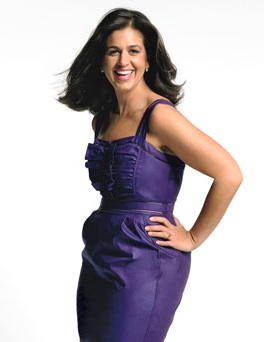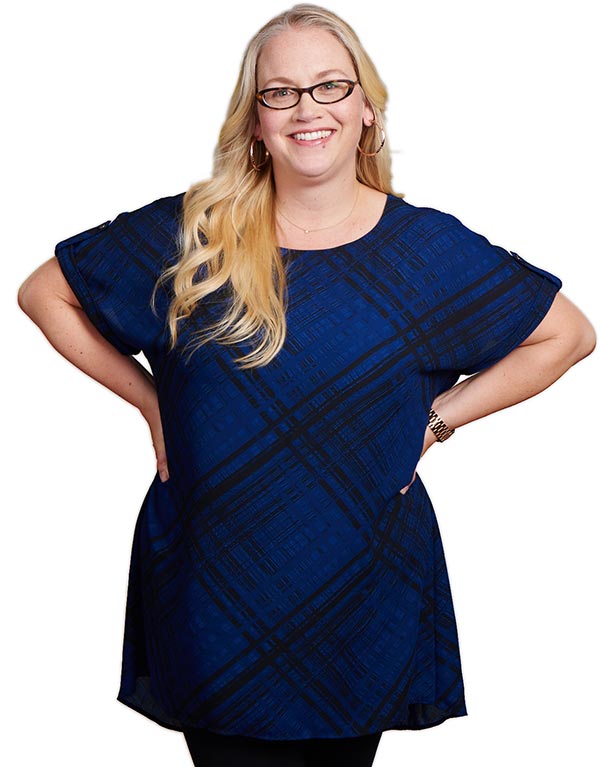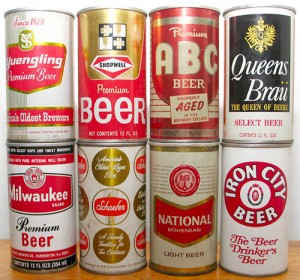
Margarita Bertsos is tackling her emotional eating issues one meal at a time. She's beautiful, inside and out!
Margarita Bertsos is an assistant editor in the health department at Glamour-and a recovering emotional eater. She’s written very honestly for the magazine about her struggles with (and victories over!) weight and bingeing and chronicled her journey for more than a year in a daily glamour.com blog. She still blogs about health, body image and weight for the site, but has been kind enough to take a break and answer a few Qs for HealthyGirl.org!
Q: You were very open on your blog about struggling with emotional eating—and your progress was a real inspiration to readers there. Can you give us a quick recap of your story?
My food issues started so long ago, I honestly don’t remember not having them. I was a totally average-sized kid, until about the 6th or 7th grade, but there are signs of my abnormal food habits much younger than that. I remember being five years old—five!—and lying to my grandmother when she asked me if I’d had any ice cream. That was probably the beginning of all my sneaky food behavior, like sneaking out of bed at night to raid the fridge, or re-arranging the platters of cookies my mom would make so it wasn’t obvious that I’d eaten half the tray. My weight didn’t yo-yo—it was a steady incline, and by the time I was in my twenties, I couldn’t stand to look at myself in the mirror (so I rarely did). That was a big sign to me that my problem wasn’t a love of food—I was using food to cope with life.
Q: You’ve written in the past that starting to work out was the real beginning of getting better for you. Tell us why exercising made such a difference. Does exercise still help you feel saner about food and your body?
Absolutely. Working out really was the gateway to tackling my eating issues. I’d spent virtually my whole life thinking of my body as my enemy. Once I started exercising, even though I still didn’t love what I saw in the mirror right away, I began to see my body as a tool. Completing challenging workouts—specifically in group fitness classes—gave me a sense of self-worth. Instead of looking for differences—“they’re skinny, I’m fat”—I started focusing on the ways I was just like everyone else: “They’re strong, and if I can get through this 45-minute spin class, I must be too,” I thought. And being an all-or-nothing kinda girl, once I started to work out, I was inspired to make better food choices, too.
Q: Do you find that support from other people who have eating issues helps you?
OMG—yes! And the whole “support” thing is really new to me; it’s not how I used to live my life. I had so much shame around my eating issues and my body that I didn’t want anyone to know about them—or anyone to try to help me. But eventually, that way of coping stopped working. I was isolating from my friends and family because of all the self-loathing than went on in my head—and, not surprisingly, I sought comfort in excess food. Out of desperation, I had to start doing things differently. Once I started opening up, people who I didn’t even know had eating issues started opening up to me. Today it’s really important for me to be honest about my situation because sometimes, no, I can’t split dessert. And sometimes I can’t even make dinner plans. And that’s not about being on a diet (I’m definitely not on one)—it’s about sanity!
Q: When emotional cravings to eat hit you these days, what do you do?
On a good day? I breathe. I pause. Really, that’s the biggest thing. Being an emotional eater means there’s really no time between having the thought that a doughnut will make things better and actually eating the doughnut. It’s still a daily—sometimes hourly—battle for me, but when I can take a minute to put some space between the thought and the chewing, I can usually see that the doughnut is really only going to make things worse. I don’t want to go back to that way of dealing with life. But being afraid that’ll I’ll re-gain all the weight (about 75 pounds) is pretty triggering, too. I can’t worry about it, because when I do, experience has shown that my face always ends up back in the ice cream. I wish I could block off the part of my brain that always leaps ahead to the future. If I could just focus on the present moment, I’d be alright. Because right now, well, I’m totally alright.
A big thanks to Margarita for sharing her story! If you guys have any Qs or comments for her leave them here and I’ll pass them on. We only sit four desks apart, so I obvi know where to find her. 
xo…Sunny
![]() Tweet This
Tweet This





I have a question — how does anyone begin to change the way they THINK?? Most of my issues about my body are contained in my own mind, and even when I go to the gym, I can’t help but think that I’m the only fat chick there (and usually, I am). I don’t take group classes for that reason, because my thoughts are consistently negative and I always assume people are judging me for my weight. And I’ve had probably hundreds of people tell me “look within yourself, you’re beautiful no matter what size you are, blah blah blah” and it doesn’t sink in. When was it that you started to change your thinking, and what triggered it? How did you overcome the negative thoughts? Even if I think positive, the negative side creeps back in and tells me that thinking positive is actually just me being unrealistic and trying to make myself feel better.
Trish: Therapy!
Hi Trish! Body image expert Leslie Goldman (http://www.lrdiaries.com/) is going to answer this Q for us on Monday’s post! I’ll email you when it goes up. Thanks again for sharing and getting this convo going.
[…] Margarita Glamour magazine […]